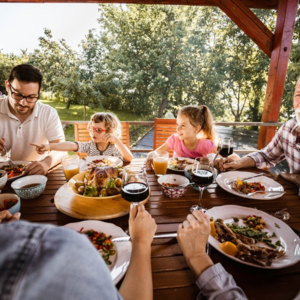Eating together: What's so good about it?
"Dinner's ready!" Do you recognise that familiar call for everyone to gather round the table and tuck in? Whether it's a takeaway with friends or a family get-together during holiday seasons, humans have been eating together for thousands of years. But why?
The discovery of fire may have kickstarted communal eating for our hunter-gatherer ancestors, according to primatologist Richard Wrangham. Cooking a meal all those years ago required a social group – you needed someone to hunt the food, someone to protect the food from thieves or predators, and of course, someone to cook. And once enjoying the feast, evolutionary psychologist Robin Dunbar speculates that the fire's bright light may have given the humans longer nights and provided great opportunities for bonding over food.
But modern humans don't face the same threats as we used to – we can cook and eat a meal by ourselves. So why should we still make group meals a ritual? In Dunbar's 2017 study 'Breaking Bread: the Functions of Social Eating', they found communal eating increased feelings of wellbeing and connectedness with the community. Despite this, the study found a third of weekday evening meals in the UK are eaten in isolation – the main cause being busy work schedules.
Today's reality is that having meals together can be difficult. Time management, fussy eaters, and family tensions are all things that can get in the way. But, in an article about overthinking family meals, Susannah Ayre and colleagues write 'Five tips to ease the pressure', including dropping the need for perfection. "There is no shame in reheating a frozen meal" or "eating on a picnic rug in the living room".
Sharing meals may look different today than it did for our ancestors, but the essence stays the same: food is more than just fuel. It can be a way to connect, share stories and strengthen bonds.
词汇表
gather round 聚到一起
tuck in [tʌk] 大吃一顿,尽情享用
takeaway ['teɪkəweɪ] 外卖
get-together 团聚,聚会
kickstart [ˈkɪkstɑːt] 启动, 促使…开始
communal [ˈkɒmjʊn(ə)l] 群体的,集体的,公共的
hunter-gatherer ancestor [ˈɡæθərə(r)][ˈænsestə(r)] 狩猎采集祖先
primatologist [ˌpraɪməˈtɒlədʒɪst] 灵长类动物学家
predator [ˈpredətə(r)] 食肉动物,捕食者,掠食者
feast [fiːst] 盛宴,宴会,大餐
evolutionary psychologist [ˌiːvəˈluːʃ(ə)n(ə)ri][saɪˈkɒlədʒɪst] 进化心理学家
speculate [ˈspekjʊleɪt] 推测,猜测,推断
bond [bɒnd] 建立纽带,联合,团结
ritual ['rɪtʃuəl] 仪式,惯例,习惯
wellbeing 身心健康,幸福
connectedness [kə'nektɪdnəs] 连结性,联系感
isolation [aɪsə'leɪʃ(ə)n] 独立,孤立
work schedule [ˈʃedjuːl] 工作时间表,工作日程
fussy eater ['fʌsi] 挑食者,偏食者
tension ['tenʃ(ə)n] 矛盾,紧张的关系
reheat [ˌriːˈhiːt] 重新加热(凉了的熟食)
picnic rug [rʌɡ] 野餐垫,野餐地毯
essence [ˈes(ə)ns] 本质,实质
strengthen bonds [ˈstreŋθ(ə)n] 增进关系,加强联系
📖 翻译、pdf见公众号【琐简】,回复"1"可进【打卡交流群】


BBC随身英语|一起用餐对我们有何益处?
2分钟 · 958·
958· 0
0
 958
958 0
0
